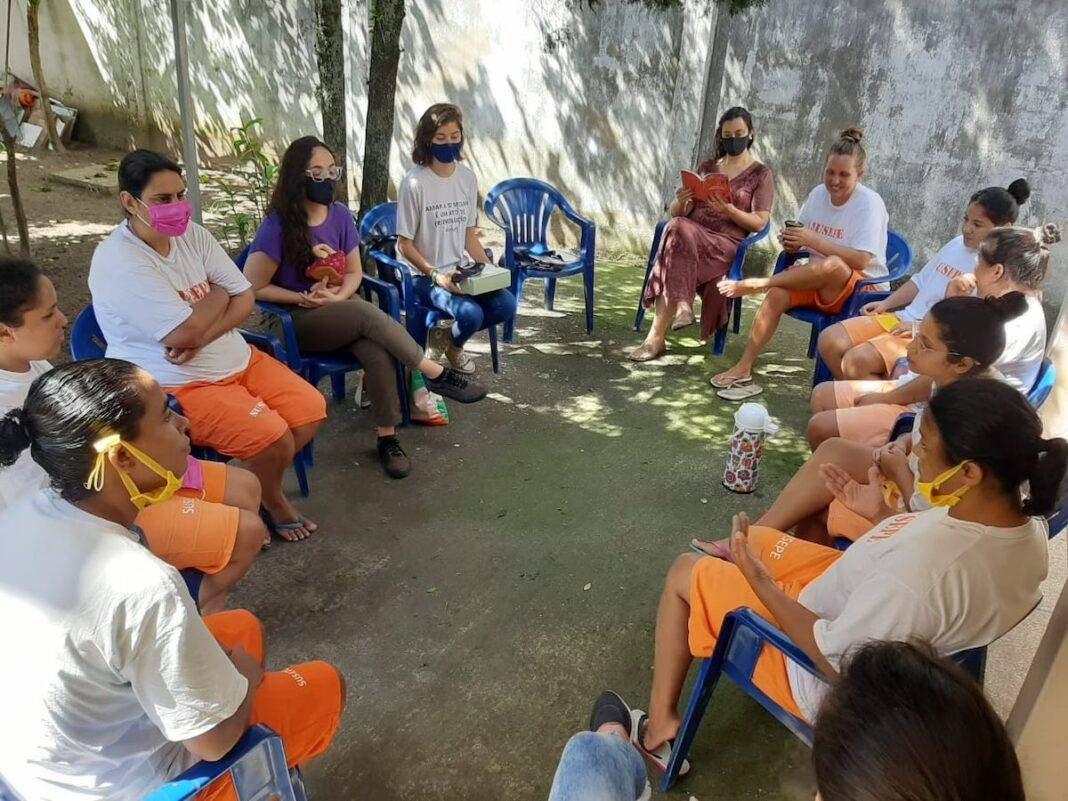A woman-founded organization aims to deliver sustainable menstruation products to Brazilian women, and tackle the culture of shame.
Most of us don’t consider disposable menstrual products, such as pads and tampons, when we think about plastic pollution. But in Europe alone, an estimated 590,000 tons of menstrual waste is generated annually.
And a culture of shame around menstruation is, in part, responsible for the dramatic increase in disposable, plastic-based menstrual products. Plastic tampon applicators were introduced because early 20th-century doctors and society were squeamish about girls and women having to come into contact with their menstrual blood during insertion. The cultural mandate for women to hide their periods has led to excess packaging. Period products are not legally required to contain a list of ingredients but pads consist of an estimated 90% plastic, as well as bleach and other toxic chemicals that are harmful to both human health and the environment.
Raíssa Kist is working to change this. In Brazil, Kist, from Porto Alegre, the capital city of Rio Grande do Sul state in the very south of the country, founded the social enterprise Herself in 2017. The idea took root when Kist was an engineering student at university and received a national scholarship to study intelligent packaging. The research project changed Kist’s thinking and led her to create Herself to help overcome the problem of menstrual waste and the culture of shame surrounding menstruation.
“I started to question this single-use consumption,” Kist says. “I was interviewing women to listen to their experiences with menstruation. I discovered that many women were suffering from allergies and other forms of discomfort due to the toxic ingredients in menstrual products.” However, the discomfort wasn’t just physical. “These women hated their periods but were open to trying something new,” Kist says. “I wanted to bring more options for all women. Above all, I wanted to break the culture of disgust over menstruation.”
In 2016, she launched a crowdfunding campaign and had local women test her first reusable product, menstrual underwear, which is sourced entirely from materials within Brazil. She later expanded to include a menstrual swimwear range after interviews with women revealed that 70% of women viewed menstruation as limiting their ability to swim or go to the beach during their periods.
Herself has also pioneered first a local, and now a national initiative, to ensure menstrual dignity for women in prisons, a group of women who experience very high levels of menstrual poverty in Brazil.
The organization conducts sewing workshops with women in prison, teaching them how to make their own reusable cotton fabric pads. The project, entitled “Revolutionize your cycle”, has a number of goals: strengthen the self-esteem of imprisoned women; reduce their prison time through the workshops counting as work; provide menstrual education, which is completely absent in Brazilian schools; and increase the financial autonomy of imprisoned women by having them supply reusable pads to low-income girls studying in public schools, a goal that Kist is currently working on in collaboration with the Porto Alegre city council.
She’s faced challenges. In Brazil, especially in poorer communities, reusable menstrual products are commonly viewed as unhygienic and backward. But Raíssa Kist promotes a counter-narrative of reusable menstrual products as modern: “Reusable pads represent evolution, technology, modernity. Our reusable pads have antimicrobial fabrics. They use the latest technology. This is why menstrual education is so important. To change consciousness, we have to open up dialogue, so that women can see the benefits of reusables.”
Period poverty isn’t simply lack of access to menstrual products, but a lack of knowledge about menstruation, which affects girls and women across the world, in both rich and poor countries. With information comes empowerment, a questioning of dominant norms, a valuing of one’s body, and often a transformation in how menstrual blood is perceived. To this end, Herself has launched a Menstruation School that conducts online courses in Portuguese to train menstrual educators who can serve as change agents in their communities.
While reusable products represent a small part of the overall menstrual market in Brazil, it is growing rapidly — one reusable period product company in Brazil (Korui), reported a 156% increase in sales in 2020. Raíssa Kist is pursuing a long-term strategy of cultural change and a broad concept of sustainability. “Our vision is one of autonomy. We want women to be able to decide,” she says. “Sustainability needs to be rooted in and connected to the reality of our country. Sustainability is not just the final product. To overcome the multiple oppressions that affect us, we need a decolonial feminism that empowers women to have autonomy over their bodies and the ability to make their own decisions.” In Porto Alegre, a new, plastic-free, menstruation-positive feminist future is being constructed one reusable menstrual product at a time.


